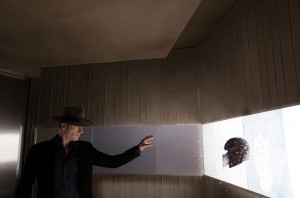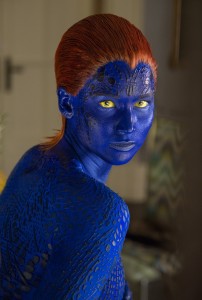 Erik Lehnsherr / Magneto (Michael Fassbender) is locked up, dozens of floors below the surface of the Pentagon. The reason he’s there is a rather delightful rewrite of history, but director Bryan Singer has even more fun in store for his escape. Peter / Quicksilver (Evan Peters) can move at the speed of light, and has already evidently been using this for his own gain, as Hank / Beast (Nicholas Hoult) notes as he glances around the basement, overflowing with consumer goods. In the most enjoyable sequence of X-Men: Days of Future Past, Charles Xavier (James McAvoy) leads Hank and Peter straight into the Pentagon, and we see how Peter can view the world, impishly shifting things in the room to leave a few seconds as a massive power shift.
Erik Lehnsherr / Magneto (Michael Fassbender) is locked up, dozens of floors below the surface of the Pentagon. The reason he’s there is a rather delightful rewrite of history, but director Bryan Singer has even more fun in store for his escape. Peter / Quicksilver (Evan Peters) can move at the speed of light, and has already evidently been using this for his own gain, as Hank / Beast (Nicholas Hoult) notes as he glances around the basement, overflowing with consumer goods. In the most enjoyable sequence of X-Men: Days of Future Past, Charles Xavier (James McAvoy) leads Hank and Peter straight into the Pentagon, and we see how Peter can view the world, impishly shifting things in the room to leave a few seconds as a massive power shift.
Quicksilver’s time in Singer’s return to the franchise is sadly – perhaps wisely – brief, but it demonstrates in minutiae the director’s talent for portraying the pleasure that can be found in being a mutant. In a film series that has spent many an hour lamenting the oppression incurred by a fearful, bigoted society, it’s a euphoric respite. Days of Future Past‘s major project goes a long way to undoing the work of the maligned X-Men: The Last Stand, famously uniting the old and young versions of Professor X (Patrick Stewart) and Magneto (Ian McKellan) – though only one scene has the generations cross paths. The film is somewhat of a Trojan horse in this regard, as it is in large part another Wolverine movie.
 Wolverine (Hugh Jackman) is the only mutant capable of withstanding the transportation of a mind forty years back in time, due to his regenerative powers. In the present day, mutants have been almost hunted to extinction by the Sentinels, highly adaptable machines created by Dr. Bolivar Trask (Peter Dinklage) in the 1970s. It was Mystique’s (Jennifer Lawrence) murder of the doctor that both set her on the path to evil and made the government determined to excise mutants from the globe. With the last bastion of mutant life gathered on a dark mountain, Professor X decides that the only solution is to send someone back to stop Mystique from taking that first deadly step.
Wolverine (Hugh Jackman) is the only mutant capable of withstanding the transportation of a mind forty years back in time, due to his regenerative powers. In the present day, mutants have been almost hunted to extinction by the Sentinels, highly adaptable machines created by Dr. Bolivar Trask (Peter Dinklage) in the 1970s. It was Mystique’s (Jennifer Lawrence) murder of the doctor that both set her on the path to evil and made the government determined to excise mutants from the globe. With the last bastion of mutant life gathered on a dark mountain, Professor X decides that the only solution is to send someone back to stop Mystique from taking that first deadly step.
For a time travel narrative, Days of Future Past is a remarkably simple and straightforward story, hanging the series’ usual dual between mutant pride and mutant shame on the duality on the narrative. In the present day, this is really a moot point, their very existence quickly hinging on the other time strand, making it very hard to be moved by the grandeur of their gradual annihilation, particularly when most are characters who we’ve barely been introduced to (plus Halle Berry’s blank Storm, thankfully granted about ten words). The focus is on the past, but for all the charm of Lawrence, Fassbender and McAvoy, they seem to have very little handle on what makes the characters pop. Fassbender is particularly ill-served by Simon Kinberg’s script, his motivations in complete disarray, bending to serve the direction the plot wants to pull him in.
As a blockbuster, X-Men: Days of Future Past seems lacking. Though all good action sequences should tie into the emotional states of the characters, Singer does this here with a deadeningly sober approach at almost every opportunity, drawing the colour out of their personas and laying it down to rest. There’s some background fun with ’70s aesthetics and fashions, but the general wave of comic book seriousness abides. Singer plays a similar game to Quicksilver as he rearranges the X-Men universe, but there’s no flamboyance to his movement and no invention in his poses. The director from the past may be this series’ future, but he needs to rediscover the joy in it.
X-Men: Days of Future Past is in cinemas now. Assets courtesy Substance PR.




